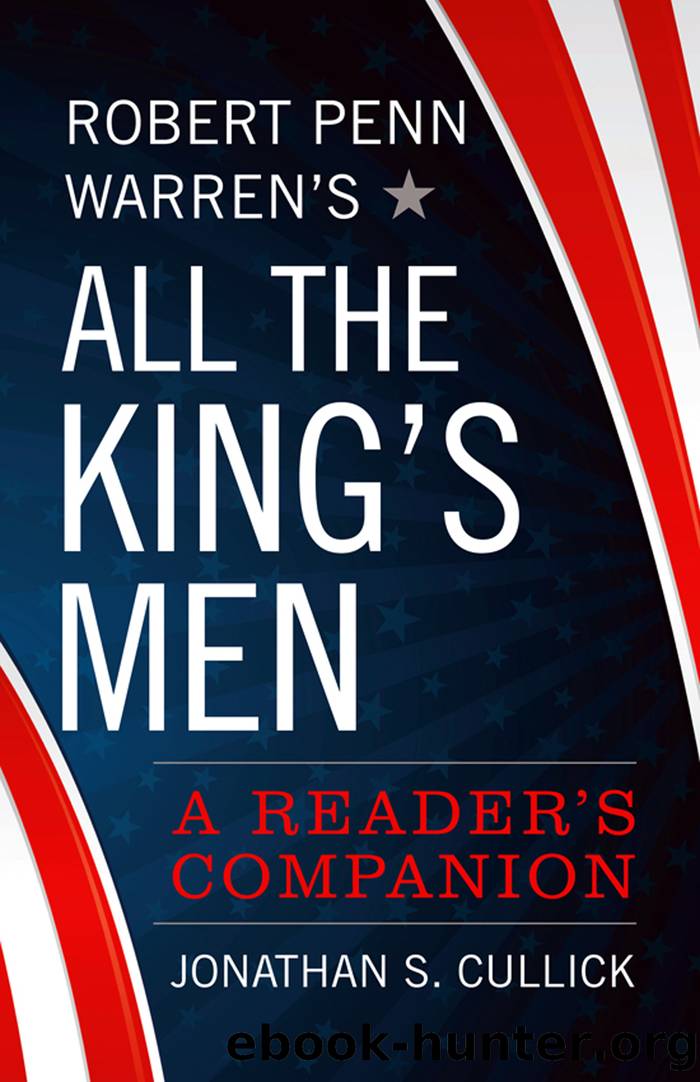Robert Penn Warren's All the King's Men by Jonathan S. Cullick

Author:Jonathan S. Cullick
Language: eng
Format: epub
Publisher: The University Press of Kentucky
Published: 2018-09-15T00:00:00+00:00
8
The Pandering Populist
âDonât Try to Improve Their Mindsâ
Willie Stark didnât start out as a fake. He had to learn how to appeal to the people, and the way to do that was to appeal to himself. The humiliation of being used by the state government âbig boysâ for their own purposes steered him toward sympathy with the rural people, who were being disserved by the political establishment. This humiliation initiated a key moment in his career that led to the emergence of his populist voice.
As a reporter for the Chronicle, Jack was assigned to cover Willieâs first campaign for governor. Jack explains to us that at that time Willieâs speeches were recitations of statistics and data points that he would rehearse in his hotel room as if he were preparing some great oration. While delivering the speeches, he would fumble with sheets of the papers filled with all the data about his tax program or road program. The speeches were boring and ignored.
Then, as Tom Eblen describes the scene, âBurden gives Stark a lesson in political rhetoric that, sadly, is as relevant today as it was then.â1 Burdenâs advice to Stark is to keep his speeches simple and limited to slogansâto stop talking about issues and start delivering talking pointsâin order to appeal not to the intellect but to the emotions. This part of the scene is significant and well known among the novelâs readers: âYou tell âem too much. Just tell âem youâre gonna soak the fat boys, and forget the rest of the tax stuffâ¦. Hell, make âem cry, make âem laughâ¦. Or make âem madâ¦. Itâs up to you to give âem something to stir âem up and make âem feel alive again. Just for half an hour. Thatâs what they come for. Tell âem anything. But for Sweet Jesusâ sake donât try to improve their minds.â2
In this scene, which Michael Washburn of Louisville Public Radio calls âthe novelâs most pivotal scene,â Jack is Willie Starkâs âfixer,â and Willie is the âneophyte.â3 The character Jack Burden could be any one of todayâs celebrity campaign strategistsâJames Carville, Lee Atwater, Mary Matalin, Karl Rove, Ken Mehlman, David Plouffe, Jim Messina, or Kellyanne Conwayâwho script, stage, prepare, and rehearse their candidates for cable television interviews and debate performances and, it must be allowed, for the âspontaneousâ moments as well. In the sound bites and photo ops of campaign advertisements and speeches, we see for ourselves candidates who âdonât try to improve their minds.â
The result of putting this advice to practice for Willie Stark is a breakout speechâa ânonspeechââin which he discovers his populist voice after his aide, Sadie Burke, reveals to him that he is being used by the party establishment only to split the vote. He finds that voice in a sense of shared victimization and resentment with his audience. Standing on the platform humiliated and disoriented (as well as hung over from an atypical binge the previous night), Willie begins by theatrically tossing the written speech aside and telling the story of his own life, a story crafted to connect to the lives of his listeners.
Download
This site does not store any files on its server. We only index and link to content provided by other sites. Please contact the content providers to delete copyright contents if any and email us, we'll remove relevant links or contents immediately.
4 3 2 1: A Novel by Paul Auster(12359)
The handmaid's tale by Margaret Atwood(7737)
Giovanni's Room by James Baldwin(7308)
Asking the Right Questions: A Guide to Critical Thinking by M. Neil Browne & Stuart M. Keeley(5745)
Big Magic: Creative Living Beyond Fear by Elizabeth Gilbert(5731)
Ego Is the Enemy by Ryan Holiday(5400)
The Body: A Guide for Occupants by Bill Bryson(5067)
On Writing A Memoir of the Craft by Stephen King(4923)
Ken Follett - World without end by Ken Follett(4712)
Adulting by Kelly Williams Brown(4557)
Bluets by Maggie Nelson(4539)
Eat That Frog! by Brian Tracy(4505)
Guilty Pleasures by Laurell K Hamilton(4430)
The Poetry of Pablo Neruda by Pablo Neruda(4084)
Alive: The Story of the Andes Survivors by Piers Paul Read(4013)
White Noise - A Novel by Don DeLillo(3997)
Fingerprints of the Gods by Graham Hancock(3981)
The Book of Joy by Dalai Lama(3964)
The Bookshop by Penelope Fitzgerald(3831)
